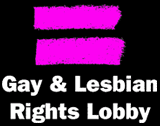

![]()
FACT SHEET: Federal Discrimination |
| Page 1 of 1 |
FEDERAL LAWS DISCRIMINATE AGAINST GAY MEN AND LESBIANS
The last 20 years have seen substantial progress towards legal equality
for gay men and lesbians under State laws for gay men and lesbians. Change
has been largely achieved under State Labor Governments with the support
of some minor parties and, in some states, support from the Coalition.
In NSW, lesbians and gay men have widespread legal recognition as de facto
couples in state law but continue to be treated unequally under Federal
laws.
FEDERAL ANTI-DISCRIMINATION LEGISLATION
Federal anti-discrimination legislation prohibits discrimination on a
number of grounds, including sex, race, ethnicity, marital status and
disability. This has been successful in prohibiting discrimination and
providing a remedy for victims. More importantly, it has proven to be
a positive tool in promoting equality. However, there is no such protection
for lesbians and gay men.
Legislation is needed because:
- Research shows high levels of workplace discrimination, refusal of services and other forms of discrimination. Violence and harassment is common in schools and elsewhere.
- State coverage is patchy and leads to many anomalies. For example, in NSW a teacher working in a school may be covered but those working in universities have no protection.
- It is essential that Commonwealth employment and services are non-discriminatory.
- Couples are not effectively covered in some states but are in others.
Transgender people are not effectively covered in some states such as Queensland. - State laws continue to discriminate.
Legislation is consistent with Australia’s international obligations. It is urgently needed as a practical matter and to send an important message that the Commonwealth Government does not support discrimination.
FEDERAL RELATIONSHIP RECOGNITION
Same sex couples were finally recognised in Superannuation law in 2004,
but there are many other areas of federal laws where our relationships
are still excluded. The most important are:
- Federal worker’s compensation
- Taxation
- Immigration
- Social Security
- Parenting and Family Law
- Marriage Law
For example, same sex partners cannot be claimed as dependents for taxation purposes. Nor can our partner’s income be counted in the few areas where household rather than individual income is counted – for example for purposes such as the Medicare levy and medical expense rebates.
While same sex partners can apply for interdependency visas, these are more onerous than de facto partner visas. Further, the number of interdependency visas available has been dramatically reduced during the term of the Howard Government.
A lack of recognition in social security law is not entirely disadvantageous for many lesbians and gay men. This is because the approach of social security law is often to reduce benefits if claimants have a partner who is working. We recognise that some same sex couples may lose benefits if comprehensive federal recognition of same sex de facto couples were to pass. However, such losses would be offset by benefits in other areas.
It is vital that lesbians and gay men are not subject to the disadvantageous aspects of relationship recognition prior to full receipt of equal benefits. Accordingly, social security laws should only be changed once there is full federal and state recognition of same sex couples. Otherwise reform could lead to an extremely unjust situation where gays and lesbians in states such as Queensland and South Australia (which still lack comprehensive de facto recognition) become ineligible for social security as they are presumed to be dependant on their partners for social security purposes but this dependence is not recognised for any beneficial purpose.
While same sex couples can already use the Family Court for disputes about children, they cannot use it to divide property – meaning that a separating couple may need to go to both state and federal courts. While the current Australian government plans to include heterosexual de facto couples in the Family Court property regime (through a referral of power by the states) they have refused to accept same sex couples. Lesbian and gay families are forced to use more expensive and less accommodating dispute regimes in this and other areas of federal law, such as child support.
The recent Marriage Legislation Amendment Act 2004 prevents valid foreign same sex marriages from being recognised under Australian law. It also enshrined the common law definition of marriage as being between a man and a woman into the Marriage Act.
WHAT NEEDS TO BE DONE?
- Anti-discrimination legislation needs to be introduced into Federal Parliament as soon as possible.
- Legislation recognising same sex cohabiting relationships as de facto relationships across all areas of federal law should be introduced into Federal Parliament as soon as possible. The exception to this comprehensive reform is in social security.
- Social security laws should only be amended once the above reforms have taken place, and same sex relationships are recognised in the laws of Queensland and South Australia. Once there is comprehensive equal treatment in the law, social security laws should also then be reformed to treat same sex and opposite sex couples equally.
More information can be obtained from our office. We would be
happy to provide research on discrimination and other issues if this would
assist. Please feel free to call Somali Cerise on 0411 869 595 or Rob
McGrory on 0404 839 905 at any time to discuss these issues further.